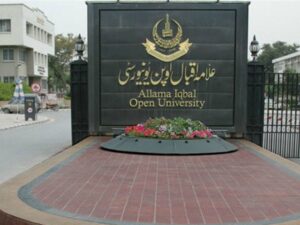Sure! Here’s a comprehensive overview of some of the largest universities in Pakistan, detailing their history, programs, and significance in the educational landscape.
1. Allama Iqbal Open University (AIOU)

Overview
Established in 1974, Allama Iqbal Open University is the largest university in Pakistan by enrollment and one of the largest distance education institutions in the world. It was founded with the vision of making education accessible to all segments of society, especially those unable to attend traditional universities due to various constraints.
Programs
AIOU offers a wide range of programs from basic education to PhDs in various fields, including humanities, social sciences, natural sciences, and management sciences. The university’s flexible approach allows students to study at their own pace and convenience, which is particularly beneficial for working individuals.
Impact
The university has significantly contributed to literacy and education in Pakistan, especially in rural areas where access to traditional universities is limited. Its distance learning model has paved the way for many individuals to pursue higher education who otherwise would not have had the opportunity.
2. University of the Punjab (PU)
Overview
Founded in 1882, the University of the Punjab is one of the oldest and most prestigious universities in Pakistan. Located in Lahore, it serves as a central hub for higher education in the region.
Programs
PU offers a diverse array of programs across various faculties, including arts, sciences, business, and law. The university is known for its rigorous academic standards and research contributions. It has a large number of affiliated colleges that extend its reach throughout Punjab.
Impact
PU has played a vital role in the socio-economic development of Pakistan by producing a large number of graduates who contribute to various sectors. The university is also known for its rich history and contributions to literature, politics, and social sciences.
3. National University of Sciences and Technology (NUST)
Overview
NUST was established in 1991 and has rapidly become one of the leading institutions for higher education in engineering, technology, and management sciences. It is headquartered in Islamabad, with multiple campuses across the country.
Programs
NUST offers undergraduate, graduate, and doctoral programs in various fields, including engineering, IT, business administration, and social sciences. The university is known for its strong emphasis on research and innovation, frequently collaborating with international institutions.
Impact
NUST has significantly contributed to the technological advancement of Pakistan. It is recognized for producing highly skilled professionals who are equipped to meet the demands of a rapidly changing job market. The university’s research initiatives have also helped address local and global challenges.
4. University of Karachi (UOK)
Overview
Established in 1951, the University of Karachi is one of the largest universities in Pakistan, located in the heart of Karachi. It serves a diverse student body and is known for its vibrant campus life.
Programs
UOK offers a wide range of undergraduate and postgraduate programs across various disciplines, including arts, science, business, and law. The university is particularly renowned for its research output in fields such as social sciences and natural sciences.
Impact
The University of Karachi has produced many notable alumni who have contributed to various fields, including politics, academia, and business. Its commitment to research and community service has made it a key player in the educational landscape of Pakistan.
5. Lahore University of Management Sciences (LUMS)
Overview
Founded in 1984, LUMS is a premier institution known for its rigorous academic programs and high standards of education. Although smaller in terms of student population compared to other universities, it has a significant impact on higher education in Pakistan.
Programs
LUMS offers undergraduate and graduate programs in business, humanities, law, and social sciences. It is particularly well-regarded for its business school, which is one of the top in the region.
Impact
LUMS has been instrumental in shaping the future leaders of Pakistan. Its emphasis on critical thinking, entrepreneurship, and innovation has helped foster a new generation of professionals who are well-equipped to tackle contemporary challenges.
6. University of Engineering and Technology (UET) Lahore
Overview
Established in 1962, UET Lahore is one of the leading engineering universities in Pakistan. It is known for its focus on engineering and technology education and research.
Programs
UET offers a variety of engineering programs at undergraduate and postgraduate levels, covering disciplines such as civil, mechanical, electrical, and computer engineering. The university also emphasizes research and development, collaborating with industry partners.
Impact
UET has contributed significantly to the engineering sector in Pakistan, producing skilled engineers who are essential for the country’s infrastructure development and technological advancement.
7. Quaid-i-Azam University (QAU)
Overview
Founded in 1967, Quaid-i-Azam University is located in Islamabad and is known for its strong academic reputation. It offers a serene environment conducive to study and research.
Programs
QAU offers a variety of programs in science, social sciences, and humanities, with a strong focus on research. The university has several research centers that contribute to advancements in various fields.
Impact
Quaid-i-Azam University has produced many influential scholars and professionals who have made significant contributions both nationally and internationally. Its research initiatives have helped address key issues facing Pakistan.
Conclusion
The largest universities in Pakistan play a critical role in shaping the country’s educational landscape. They provide diverse academic programs, promote research, and contribute to the socio-economic development of the nation. Each institution has its unique strengths, catering to the diverse needs of the student population. As Pakistan continues to develop, these universities will be instrumental in equipping future generations with the knowledge and skills necessary to thrive in a globalized world.
In summary, the contributions of these universities extend beyond education; they are vital to innovation, research, and the overall development of society in Pakistan.